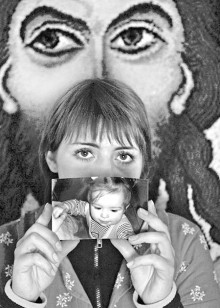It seems that the Belarusian authorities are very partial to photography, especially that of the documentary kind which truthfully, without retouching, reflects life. In 2011, the nation’s government took fright when a university student by the name of Anton Suryapin took pictures of the famous “teddy bear airdrop,” and the student paid for his “offense” with half a month in the Belarusian KGB’s pre-trial prison.
This time, it was the reputable photo competition Belarus Press Photo that had attracted the security service’s attention. The law-enforcement officers found... signs of extremist activity there! A few days ago, the competition’s organizers, press photographers Vadym Zamirovsky and Yulia Doroshkevich were summoned to court on charges of spreading distortions about functioning of the Republic of Belarus.
According to the KGB officers, the album that the photographers have published following the competition contains “deliberate distortions, lies, and fabrications concerning functioning of the Republic of Belarus in the political, economic, social and other fields which dishonor and humiliate the Belarusian nation and its citizens.” However, on accessing the Belarus Press Photo’s site pressphoto.by, we were unable to find in the published photos any hints of “provoking unrest, staging terrorist attacks and using guerrilla warfare techniques,” as extremism is defined in the Russian Wikipedia. Moreover, every photo has a clear provenance listed on the site, informing the visitor where it was taken and whom it depicts, sometimes even providing a detailed story of the photo’s character.
Doroshkevich told the BBC she disagreed with the album’s characterization as “extremist” by the KGB. “The documentary photography reflects reality as it is. Both the Belarus Press Photo competition and our winners’ album contain eight highly diverse sections, covering nature, portraits, sports, that is, the entire variety of the year’s developments,” she said. It should be noted that the photos in question were taken in 2011, during a spike in the Belarusian social and political protest movement.
The Belarusian Association of Journalists (BAJ) came to the organizers’ defense, too. “We believe that the very institution of court proceedings for ‘extremism in the photographs’ is absurd,” its statement reads. “The album’s photographs neither contain any extremist calls nor promote extremism. Photos are merely illustrating reality, they do not create it. By definition, they cannot ‘contain deliberate distortions, fabrications and lies concerning functioning of the Republic of Belarus.’” The BAJ states on its site further that “the prosecution experts complained of ‘the album compilers’ selection of material in general,’ indicating that it is the experts, not the album’s creators who are biased.”
Zamirovsky told The Day that the court summons were just a continuation of the November 2012 incident that occurred when the photographers were returning from an exhibition in Lithuania. The Belarusian customs officers seized 41 copies of The Press Photo Belarus 2011 album. Early explanation was that the copies had to be examined by experts before being imported. However, the KGB examination of the contents brought charges of extremism later on.
“The album was published exactly a year ago in April 2012 as a totally legal project, and the bulk of the print run had been imported into the country, with us paying all required customs duties. Of course, they did examine it back then, but had not found any extremism,” Doroshkevich told Gazeta.ru online publication. “The album has been completely sold out, no more than a couple copies have been left at book stores.”
“What extremist content has the KGB found in your album?” The Day asked Zamirovsky.
“I understand that the court file contains a description of specific images from the book that were wrong with the commission which had been established to assess to what extent the book is extremist. When we will get to see the file, we will know what specific photographs came to be seen as problematic.
“Journalists in Belarus are divided into two categories: those who work in public media, and have their special relationship with the authorities, and those who work in private publications and have a different kind of relationship with the authorities. The Belarus Press Photo competition and the resulting book are a platform that brings together the entire community, working for public and private media alike. We have never limited participation to this or that category and have no plans to do it in the future. Unfortunately, we face problems such as the current one.”
Your competition has been held for several years. Why the complaints appeared only recently? What are your explanations?
“We began working on the competition as early as in the fall of 2009, but the first event was launched in 2010. We followed it with our first album Belarus Press Photo 2010. The publication of the second album in the series was the first time we got any complaints. I think there was a personal factor behind it, because when we were traveling from Lithuania with a 41-copy-strong bunch, the Belarusian customs officers found something suspicious in them. In vain we explained to them that it was just leftovers of the larger print run and even asked them to look for it in their database. It turned out they had no such database and thus they decided to seize the books. The albums were transferred to the regional executive committee’s commission for examination. The commission did not find anything suspicious in them, but instead of returning the albums to us, they transferred them on to the KGB. This story began in the fall of 2012, but we still have no clue why it went to the trial just now.”
You have been summoned to the court hearing to be held on April 17. What do you expect from it?
“I think the court will confirm that the album’s content is extremist. I understand that this trial has been launched to get the excuse to destroy the seized albums. Of course, we will defend ourselves and do everything to prove our case.”







